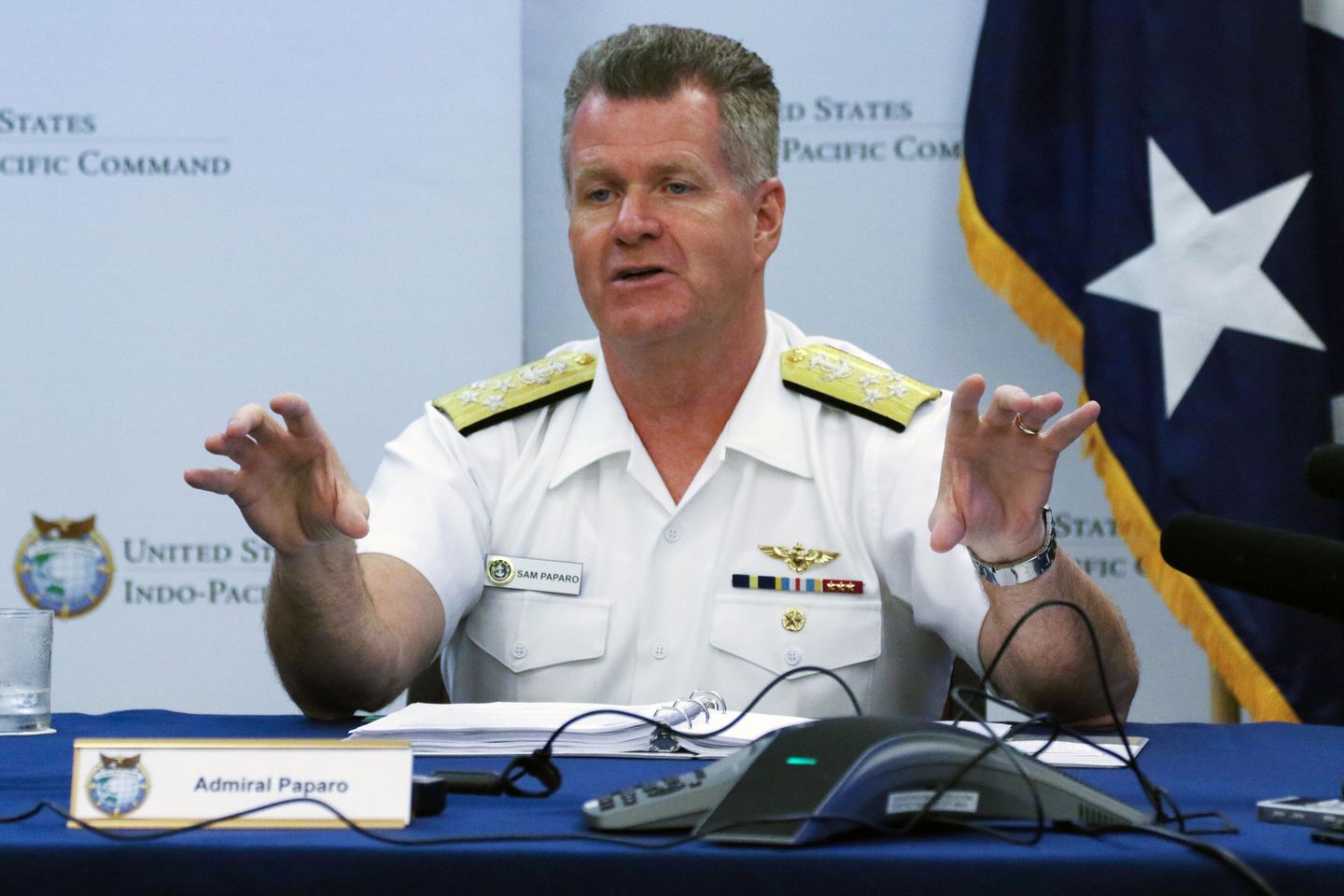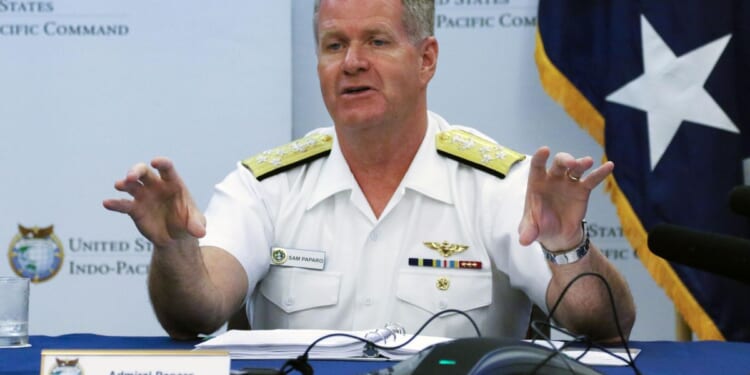
NEWS AND ANALYSIS:
Growing dangers of a war with China highlight the urgent need to improve the military’s ability to supply troops in the Pacific with weapons and other support, the admiral in charge of the Pacific Fleet says.
Navy Adm. Sam Paparo, the commander slated for promotion to head the Indo-Pacific Command, said in a recent speech that military logistics — ships, aircraft and other systems used to sustain military operations — are on “the razor’s edge.”
“We, my friends, are on narrow margins within the combat logistics force,” Adm. Paparo told a defense conference in San Diego called West 2024 on Feb. 14. The military built a logistic system based on market efficiency and the world is moving toward a different concept of “national resiliency,” he said.
“We postulated in 1992 that we would operate from the sea and that we would enjoy complete command of the sea, and our defense industrial base followed,” the four-star admiral said. “And now as a result, we find ourselves in a 21st century changing security environment with a late 20th century defense industrial base that’s oriented on efficiency instead of effectiveness.”
The first step in solving the problem is to develop a larger, more modernized and more capable logistic force, relying on advanced information technology. But information technology alone will not be enough, he said, noting that a “mass” of hardware is needed.
Echoing Stalin’s quip that quantity has a quality all its own, Adm. Paparo said: “Mass has a logic all its own. An app is not going to feed a troop in the field. So, it is absolutely critically important to raise our level within the combat logistics force.”
The military is also working to develop a new fuel resupply system called “consolidated cargo replenishment at sea,” or CONSOL, that uses both commercial and military supply ships. Adm. Paparo said the system serves as a “bucket brigade” that will move fuel closer to the front lines in future zones.
In simulated war games against Chinese forces staged by U.S. officials, the People’s Liberation Army has targeted the enemy’s logistics systems in a conflict each time, making it even more urgent for the U.S. to address the problem.
“We’re raising the alarm that we are on the razor’s edge,” Adm. Paparo said. “We can’t advocate enough for this.”
Earlier this month, GOP Rep. Mike Gallagher, chairman of the House Select Committee on the Chinese Communist Party, wrote to military and civilian leaders warning about shortfalls in sealift for a Pacific conflict. The problems are a “screaming national security vulnerability” requiring urgent attention, the Wisconsin Republican said in a letter to the commander of Transportation Command and chief of the Transportation Department’s Maritime Administration.
On China, Adm. Paparo cited a quote from military strategist Edward Luttwak: “Beware of land power that turns to the sea.”
“Today, in the Indo-Pacific, the [People’s Republic of China] has turned to the sea in its threats to Taiwan across the strait, in the South China Sea and the East China Sea,” the admiral said, noting Beijing’s aggressive territorial claims to waters and features. “The PRC’s words and deeds are revanchist, revisionist and expansionist.”
Adm. Paparo said military forces in the region are working to deter a conflict with China, one that could begin with battles in space cyber and the information domain.
House panel investigates NewsGuard role in recruiting crisis
Amid significant recent recruiting shortfalls by the U.S. military, four members of the House Armed Services Committee are calling on a major Air Force recruiting contractor to explain whether the company relies on two groups identified in recent legislation as biased against conservatives.
In a letter to Duff Stewart, chief executive of the Austin, Texas-based firm GSD&M, the House Republicans asked if the company used advertising blacklists supplied by NewsGuard Technologies, which is also a Pentagon contractor, the Global Disinformation Network, or similar groups in determining where to place recruitment advertisements for the Air Force.
The letter was sent Feb. 9 in response to a provision of the fiscal 2024 National Defense Authorization Act that requires military advertisers to certify they are not placing ads based on “political preferences or biases, or determinations of misinformation” by such groups.
“This provision responds to concerns that advertising blacklists are effectively created by groups like NewsGuard Technologies and the Global Disinformation Index by providing advertising firms with lists which rank or rate media by subjective and often political criteria which, in turn, artificially limit military recruitment advertisements’ reach,” the letter states.
The letter said the media-monitoring organizations have shown “well-documented bias” against “media outlets read or viewed by those most likely to be interested in military service.”
The letter was signed by Reps. Jim Banks of Indiana, who chairs the panel’s military personnel subcommittee, Mike Waltz of Florida, Jack Bergman of Michigan and Elise Stefanik of New York.
The lawmakers stated that the panel is investigating whether the current “recruiting crisis” is in part the result of the Biden administration’s “woke” policies, which are turning off many to a career in the military. All services fell short of recruiting goals by 41,000 recruits, the lawmakers noted.
“The extent to which the [Defense Department] and its contractors have prioritized social justice and political correctness over national security, readiness and lethality will be a major focus of this investigation,” the letter said.
According to the lawmakers, GSD&M was paid $741 million over 10 years for Air Force recruiting work. The letter asked Mr. Stewart a series of questions about whether GSD&M used NewsGuard, the Global Disinformation Index or similar groups to determine whether and where to buy ads based on the groups’ biases, content ratings or fact-checking.
Answers are due to Congress by Feb. 26, and hearings are planned.
A spokesman for GSD&M did not immediately respond to a request for comment.
NewsGuard Co-CEO Gordon Crovitz denied the company is biased against conservatives, calling the firm apolitical and transparent. Its assessments of news sources fairly rate both liberal and conservative outlets, he said.
“The work we have done for the Pentagon has nothing to do with ratings of news sites or advertising,” Mr. Crovitz said.
“Instead, our journalistically trained analysts with domain expertise are often the first to discover new Russian, Chinese and Iranian/Hamas disinformation claims.”
Top NSA cyberspy steps down
The National Security Agency’s most senior cybersecurity official is retiring after a career that included a long stint heading the agency’s cyberattack unit and handling damage from disastrous NSA leaks by former contractor Edward Snowden.
Rob Joyce, director of cybersecurity for the electronic spying agency, will leave the agency’s headquarters at Fort Meade, Maryland, at the end of March, the NSA announced on Tuesday.
For an agency that at one time was so secret its name was classified, Mr. Joyce was among the highest-profile electronic spies ever to work at what has been dubbed “the Fort.”
Since 2016, Mr. Joyce made numerous public appearances on U.S. news outlets, mainly to promote cybersecurity. He was also the White House cybersecurity czar during the Trump administration.
In more than 34 years in the hacking and electronic spy business, Mr. Joyce headed NSA’s elite Tailored Access Operations, or TAO, department for several years beginning in 2013. The existence of TAO, which is tasked with breaking into computer networks of foreign nations, was disclosed by some of the estimated 1.7 million NSA secret documents disclosed by Mr. Snowden before he fled the country and was eventually given sanctuary in Russia.
The documents revealed that TAO hackers could infiltrate networks at the speed of light using satellites, fiber-optic connections, “zero-day” software vulnerabilities and planted malware.
Mr. Joyce was a central official in explaining the damage from the Snowden leaks, including a revealing interview with CBS’ “60 Minutes” several years ago.
Intelligence officials said the NSA for decades was notorious for criticizing security failures of other agencies and warning about insiders compromising secrets — only to suffer one of the worst insider intelligence failures in U.S. history.
On his X account in 2022, Mr. Joyce tweeted that if you once worked for the NSA or elsewhere in the intelligence community, “Come on back!” since the NSA was seeking to fast-track former employees who wanted to return to work at the Fort.
The fugitive Mr. Snowden posted in reply on X from Russia: “Thanks. I’ll pass.”
“It has been a privilege to lead the nation’s most talented and dedicated team of cybersecurity professionals. Making a difference in the security of the nation is truly an honor,” Mr. Joyce said, according to an NSA statement.
• Contact Bill Gertz on X @BillGertz.












